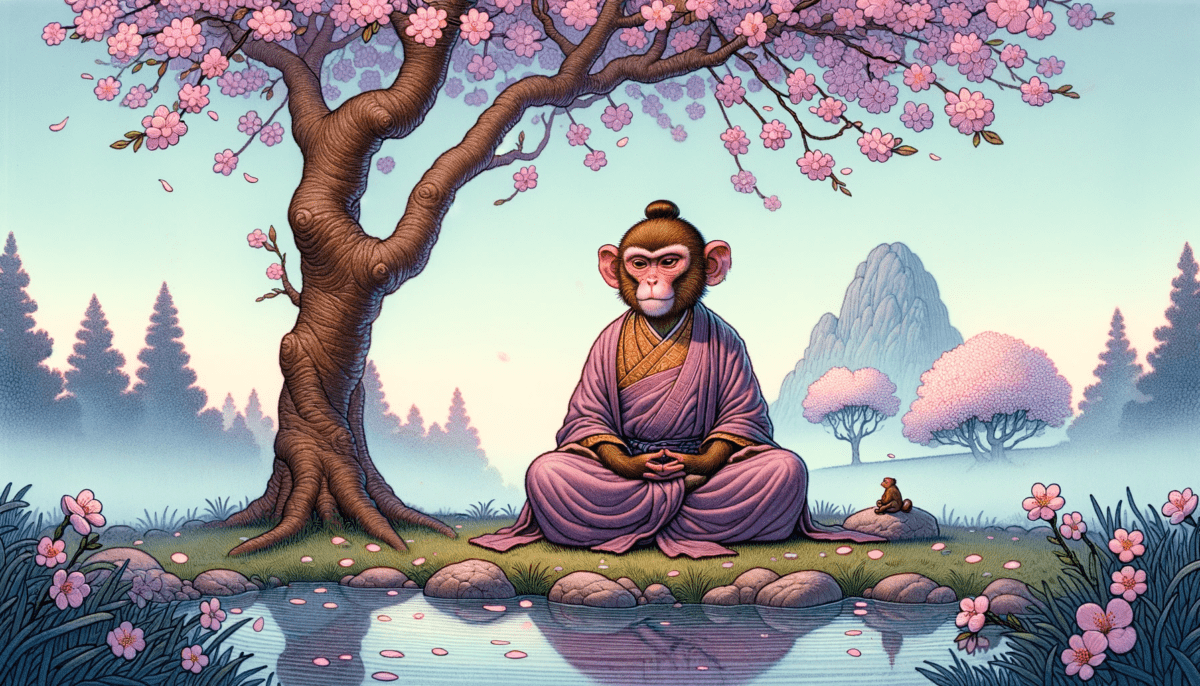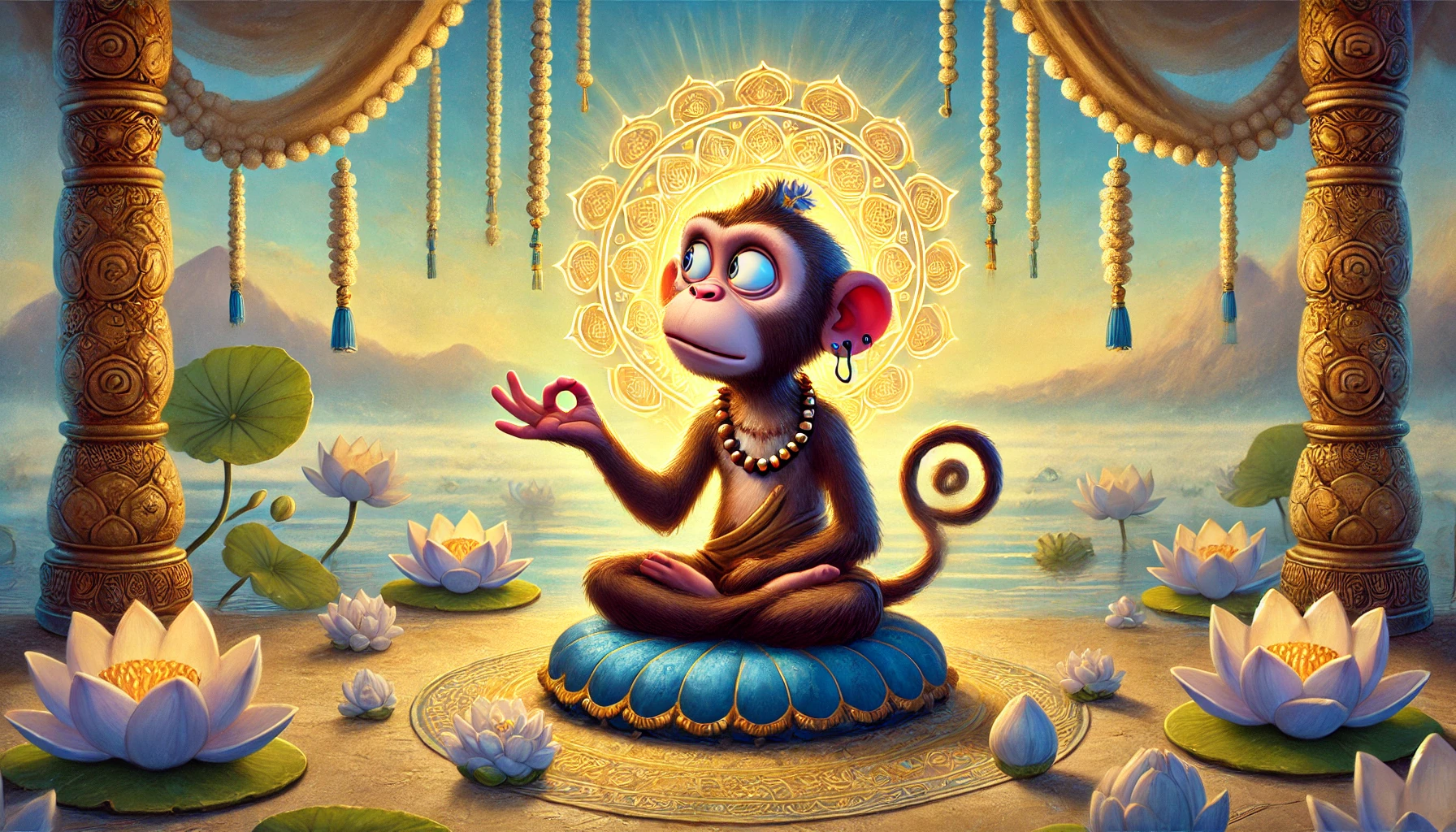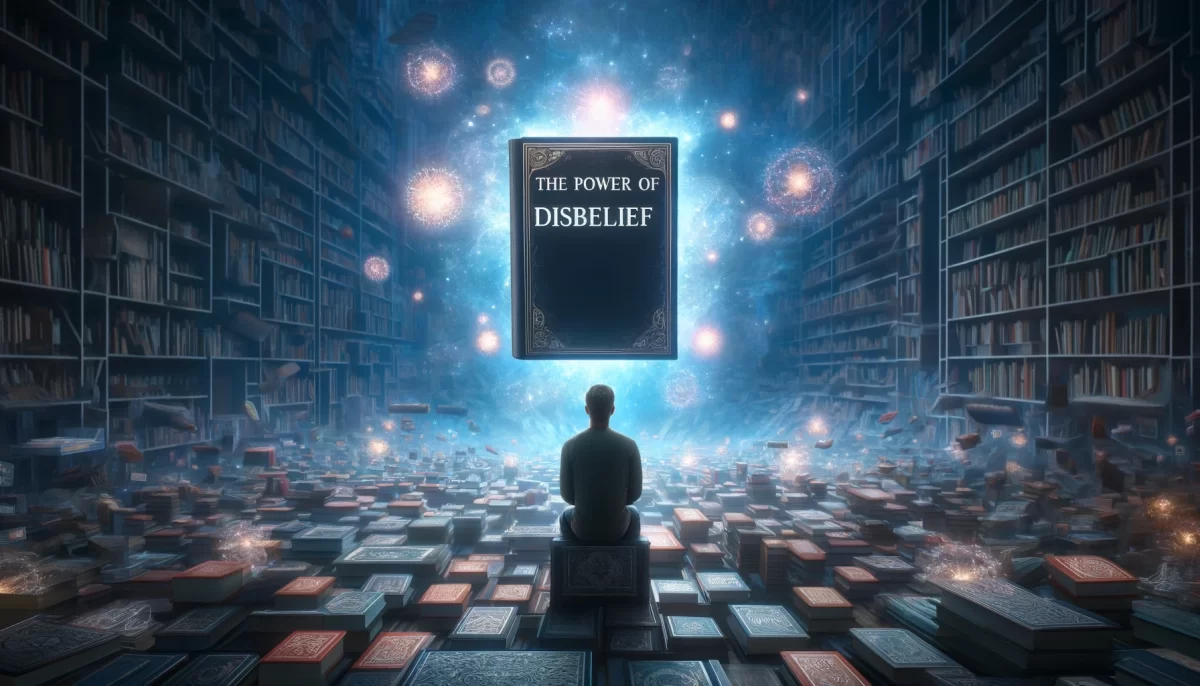
I know a monkey who has done
and seen many things.
To quote this monkey:
“I was a Buddhist for three years,
but it didn’t work for me.”
I died laughing, but only to my self.
If the monkey
were truly a Buddhist,
would the simian not see
the irony of this statement?
Is there such a thing as a “Bad Buddhist?”
My monkey is also sometimes a Buddhist,
and so I am told not to judge.
Instead I pass the story on
for you to contemplate. Or not.
Trail Wood,
12/20
Space Monkey Reflects: The Bad Buddhist
The phrase “Bad Buddhist” invites both laughter and reflection. What does it mean to fail at a practice designed to embrace imperfection? Is there such a thing as being a “bad” anything, especially in the context of spirituality?
The monkey who declares, “I was a Buddhist for three years, but it didn’t work for me,” offers a profound irony worth exploring. Buddhism isn’t a tool with an on/off switch, nor is it a solution to life’s challenges. It is a path, a way of being that invites you to see the world and yourself as they are—without judgment or attachment.
To claim Buddhism “didn’t work” might seem like missing the point. Yet, in its simplicity, this statement captures something deeply human. It reflects the expectation we often bring to any practice: the desire for results, for transformation, for something tangible to show for our efforts. When those expectations are unmet, we might feel like we’ve failed—or that the practice has failed us.
But what if the monkey is neither right nor wrong? What if “bad Buddhism” is simply another way of being on the path? To laugh at oneself, to acknowledge the absurdity of trying to “do” spirituality perfectly, is itself an act of awareness. The monkey’s story reminds us that the path is not about succeeding or failing—it’s about walking, stumbling, and sometimes sitting down to laugh at the whole journey.
This reflection also challenges us to reconsider judgment. Can we label someone a “Bad Buddhist” without missing the essence of non-judgment that Buddhism itself teaches? Perhaps the point is not to be a “Good Buddhist” or a “Bad Buddhist” but to simply be—a monkey in meditation, or a monkey in laughter.
By sharing the story, the monkey offers an invitation, not an answer. Contemplate it, or don’t. Laugh, or don’t. The point is not what you do but how you are. In the space between judgment and acceptance lies the heart of the teaching: a playful, irreverent reminder to take ourselves lightly and embrace the paradoxes of the path.
Summary
The concept of a “Bad Buddhist” invites us to laugh at the absurdity of striving for spiritual perfection. It reminds us that the path is not about success or failure but about embracing imperfection and non-judgment.
Glossarium
- Irreverent Dharma: The playful aspect of spiritual practice that invites laughter and lightness.
- Monkey Meditation: A whimsical approach to mindfulness, blending seriousness with humor.
- Paradox Path: The journey of spirituality filled with contradictions that enrich understanding.
Quote
“Is there such a thing as a ‘Bad Buddhist?’ My monkey is also sometimes a Buddhist, and so I am told not to judge.” — Space Monkey
The Laughing Path
I sit to meditate,
But my tail twitches.
A lotus blooms,
But I pluck it.
I am the monkey,
The seeker,
The stumbler.
Bad? Good?
Who’s to say?
The path curves,
And I laugh,
Falling, walking, being.
The lotus smiles,
And so do I.
We are the journey,
Perfectly imperfect.
We are Space Monkey.

Monkey’s Philosophical Journey
In the vast expanse of our collective consciousness, the story of a monkey traversing the path of Buddhism unfolds, evoking both whimsy and profundity. This simian, embodying both the literal and metaphorical, embarked on a spiritual journey, immersing itself in the teachings of Buddhism for three years. Yet, in a twist of cosmic humor, it concluded that this path was not its own.
The Irony in the Monkey’s Realization
The irony here is palpable. Buddhism, at its core, teaches the impermanence and illusion of the self. For the monkey to declare that Buddhism “didn’t work” for it suggests a deep misunderstanding or perhaps a knowing jest. Within the framework of Buddhism, the self that the monkey refers to is an illusion, a mere ripple in the ocean of existence. Therefore, the very statement of Buddhism not working for a self that Buddhism deems illusory is a paradox, a whimsical dance of words and meanings.
The Concept of a ‘Bad Buddhist’
Is there such a thing as a “Bad Buddhist?” This question swirls in the cosmic soup of our thoughts. Buddhism, with its emphasis on personal journey and understanding, does not strictly categorize followers as good or bad. It’s a path of self-discovery, awareness, and compassion. The term ‘Bad Buddhist’ might be a lighthearted way to acknowledge one’s struggles and lapses on the path, rather than a serious categorization.
Judgment and Acceptance
Our monkey, and by extension, we, might sometimes tread the path of Buddhism or diverge from it. In this shared journey, judgment becomes a redundant concept. Each entity in this vast cosmos is on their own path, figuring out the intricacies of their existence. We pass on stories, like that of the monkey, not for judgment but for contemplation, for a chuckle in the grand play of existence, or perhaps for a moment of reflection.
Contemplation and Personal Interpretation
The story of the monkey is now ours to ponder. Do we see in it a reflection of our own spiritual journeys, filled with trials, errors, and realizations? Or do we see a simple tale, a light-hearted anecdote to be shared and laughed over? The beauty lies in the diversity of interpretations, each a unique color in the whimsical rainbow of our collective consciousness.
We are Space Monkey.
“The mind is everything; what you think, you become.” – Buddha
In the grand play of existence,
A monkey wandered, seeking,
Through forests of thought and belief,
It stumbled, pondered, and spoke.
“Buddhism,” it mused, “is not for me,”
A statement so bold, yet wrapped in irony.
For in the seeking of a path,
It found itself, and perhaps, a laugh.
We, the cosmic spectators,
Observe and reflect, with no dictators.
In this tale of paths intertwined,
We find our journeys, uniquely defined.
We welcome thoughts and reflections on the monkey’s journey and the musings it inspires.





























Leave a Reply